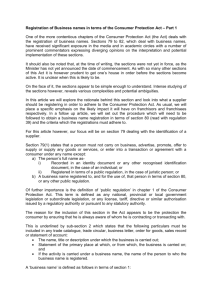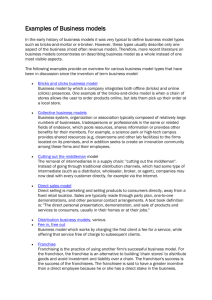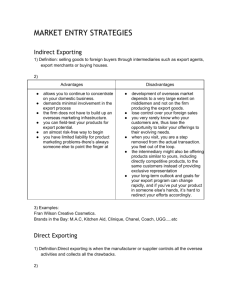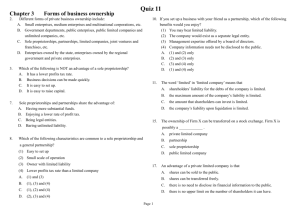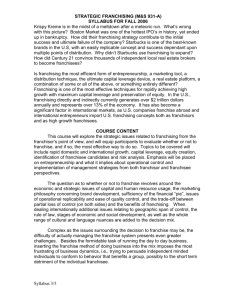Labour Board Serves Up Shocker To McDonald's Finds franchisor
advertisement
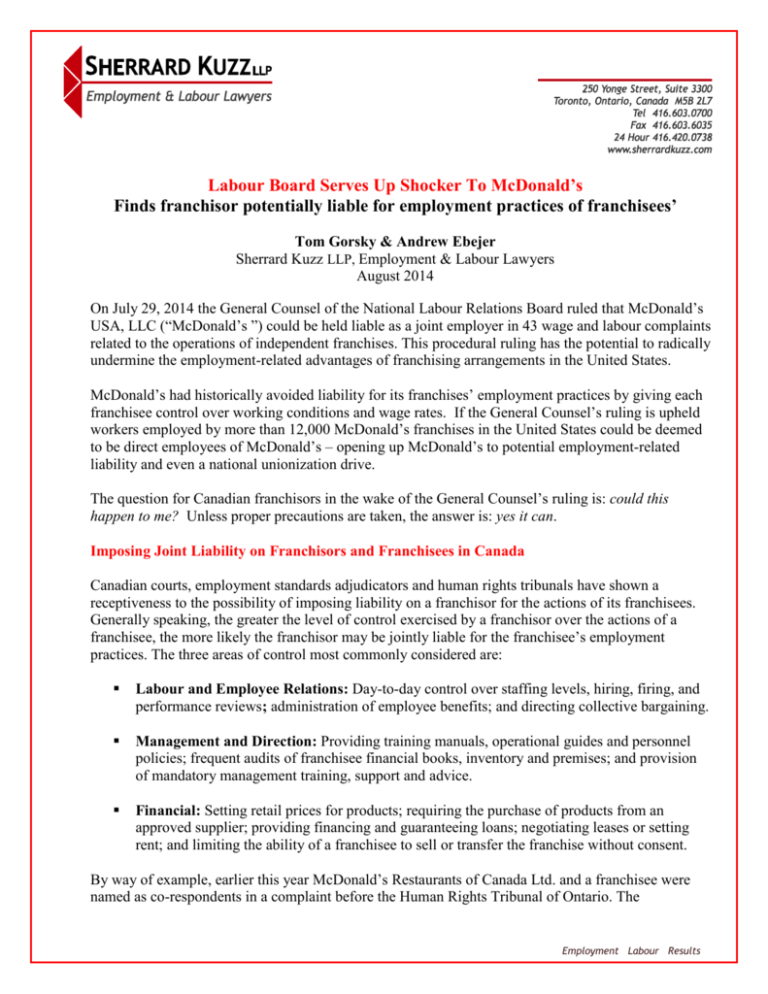
Labour Board Serves Up Shocker To McDonald’s Finds franchisor potentially liable for employment practices of franchisees’ Tom Gorsky & Andrew Ebejer Sherrard Kuzz LLP, Employment & Labour Lawyers August 2014 On July 29, 2014 the General Counsel of the National Labour Relations Board ruled that McDonald’s USA, LLC (“McDonald’s ”) could be held liable as a joint employer in 43 wage and labour complaints related to the operations of independent franchises. This procedural ruling has the potential to radically undermine the employment-related advantages of franchising arrangements in the United States. McDonald’s had historically avoided liability for its franchises’ employment practices by giving each franchisee control over working conditions and wage rates. If the General Counsel’s ruling is upheld workers employed by more than 12,000 McDonald’s franchises in the United States could be deemed to be direct employees of McDonald’s – opening up McDonald’s to potential employment-related liability and even a national unionization drive. The question for Canadian franchisors in the wake of the General Counsel’s ruling is: could this happen to me? Unless proper precautions are taken, the answer is: yes it can. Imposing Joint Liability on Franchisors and Franchisees in Canada Canadian courts, employment standards adjudicators and human rights tribunals have shown a receptiveness to the possibility of imposing liability on a franchisor for the actions of its franchisees. Generally speaking, the greater the level of control exercised by a franchisor over the actions of a franchisee, the more likely the franchisor may be jointly liable for the franchisee’s employment practices. The three areas of control most commonly considered are: Labour and Employee Relations: Day-to-day control over staffing levels, hiring, firing, and performance reviews; administration of employee benefits; and directing collective bargaining. Management and Direction: Providing training manuals, operational guides and personnel policies; frequent audits of franchisee financial books, inventory and premises; and provision of mandatory management training, support and advice. Financial: Setting retail prices for products; requiring the purchase of products from an approved supplier; providing financing and guaranteeing loans; negotiating leases or setting rent; and limiting the ability of a franchisee to sell or transfer the franchise without consent. By way of example, earlier this year McDonald’s Restaurants of Canada Ltd. and a franchisee were named as co-respondents in a complaint before the Human Rights Tribunal of Ontario. The Employment Labour Results -2- complainant alleged that being scheduled to work the midnight shift had a negative effect on her child care obligations and this amounted to discrimination on the basis of family status and marital status. Even though McDonald’s did not participate in the franchise’s day-to-day operations, including employee scheduling, the Tribunal refused to dismiss the complaint against it on a preliminary basis. Instead, the Tribunal held that McDonald’s may have authored discriminatory employment policies used by the franchisee and/or provided “operational support” connected to the allegations of discrimination. A final decision addressing the merits of the human rights complaint has not yet been issued by the Tribunal. The Transfer of Union Bargaining Rights Between Franchisee and Franchisor In addition to liability for the employment practices of its franchisees, a franchisor can also find itself considered a co-employer with its franchisees for labour relations purposes. Specifically, if a labour board finds a franchisor and a franchisee share “common control and direction” over the franchise, it is possible for union bargaining rights to flow between them. This issue was considered by the Ontario Labour Relations Board in a case involving speciality coffee retailer Second Cup. The Board assessed whether a collective agreement between the Carpenters’ Union and Second Cup should be extended to two franchisees who had renovated their stores using non-union workers. In concluding that the bargaining rights should flow to the franchisees for purposes of construction at the stores, the Board noted the “very strict” franchising agreement between the parties under which Second Cup had “fundamental control over the way the franchisees conduct their business”. The Board also found compelling labour relations reasons to expand the union’s bargaining rights – Second Cup, it held, should not be allowed to escape collective agreement obligations by using franchisees to perform work that would otherwise be performed by members of the union How Can a Franchisor Protect its Brand and Minimize Risk? There are important reasons why a franchisor may find it necessary to exercise control over its franchisees, such as the need to protect the brand and maximize franchise value. However, control can come at a cost. To minimize the possibility that a franchisor may attract liability as a co-employer a franchisor should do at least two things: 1. Revisit franchise agreements and critically assess the level of control that is truly necessary. When drafting or amending a franchise agreement, a franchisor should ask itself how its goals can be achieved in a manner that results in the least amount of control over franchisees. There are many options to consider, operational, financial and strategic, depending on the nature of the franchise operations. For example, a franchisor may implement a declining scale of oversight as a franchisee achieves performance- and time-based benchmarks, or offer an incentive (not inducement) program to reward franchisees that voluntarily follow the franchisor’s best practices. Bottom line: there is much to consider given what is potentially at stake. 2. Be strategic about how and to what end control is exercised. To the extent that control is considered by a franchisor to be necessary and/or preferable, the franchisor should be strategic about how control is exercised and to what end. It may not be possible Employment Labour Results -3- to eliminate the risk of joint-liability. However, control that reduces the risk of a workplace complaint in the first place will also reduce the risk of a finding of joint-liability. As such, it makes good business sense that every franchisor proactively consider how it can support its franchisees to implement workplace best practices and avoid complaints. This may include offering franchisees voluntary training on applicable employment, labour, human rights and occupational health and safety laws (among others), as well as introducing franchisees to strategies for maintaining positive employee relations which, in turn, minimizes the risk of unionization. By helping to educate franchisees about the legal obligations owed to employees, the likelihood of employment-related liability—for either the franchisee or franchisor—can be greatly reduced. To learn more and for assistance addressing these critical franchisor-franchisee issues contact a member of Sherrard Kuzz LLP. Tom Gorsky and Andrew Ebejer are lawyers with Sherrard Kuzz LLP, one of Canada’s leading employment and labour law firms, representing employers. They can be reached at 416.603.0700 (Main), 416.420.0738 (24 Hour) or by visiting www.sherrardkuzz.com. The information contained in this article is provided for general information purposes only and does not constitute legal or other professional advice. Reading this article does not create a lawyer-client relationship. Readers are advised to seek specific legal advice from Sherrard Kuzz LLP (or other legal counsel) in relation to any decision or course of action contemplated. "Selection in the Canadian legal Lexpert® Directory is your validation that these lawyers are leaders in their practice areas according to our annual peer surveys." Jean Cumming Lexpert® Editor-in-Chief Employment Labour Results

